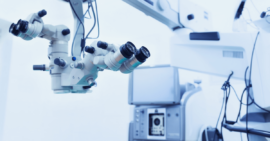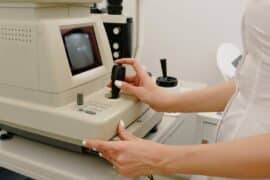Behind the Scenes: What Happens During a LASIK Procedure?
One of the most performed ways to achieve clear, sharp vision is to undergo LASIK, laser-assisted in situ keratomileusis, a laser eye procedure that changes the shape of the cornea. A mechanical microkeratome blade device or a laser keratome is used to cut a flap in the cornea to correct refractive errors of myopia, hyperopia,…
Read MoreA Day in the Life After LASIK: What to Expect Post-Surgery
Super clear, sharp vision is by far the greatest benefit to LASIK surgery. A close second is the recovery time. Most people are ready to resume normal activities within a day or two of surgery. But as you can imagine, your surgeon may have a little bit of advice on LASIK healing strategies. Knowing what…
Read MoreThe Best Way to Find a LASIK Surgeon
You cannot put a price on your vision. The best way to find a LASIK surgeon is not to go bargain shopping looking for the best deal. Your first step should be finding a surgeon with credentials. LASIK surgeons should have a lengthy list of qualifications, education, training and certifications. These include a state licensing…
Read MoreLASIK Bucket List-Activities to Enjoy After LASIK Surgery
Most people who undergo LASIK do so because they are ready to be rid of contact lenses and eyeglasses forever. While refractive error correcting devices helped you see the world more clearly, there were likely activities that you missed out on or were more difficult to do wearing glasses or contacts. For example, you may…
Read MoreCan I Travel After LASIK?
While all patients have a different rate of recovery, LASIK patients generally resume normal activities within a couple of days of surgery. LASIK has an outstanding success rate and recovery is a breeze, with complications being a rarity. Even mild, common side effects pass within a short time; some of these include light sensitivity, halos…
Read MoreWhat Should I Expect My Vision to Be Like for The First Few Weeks After Surgery?
LASIK is one of the most popular and sought after corrective eye surgery options primarily due to its incredibly quick recovery time. Most patients find they have near perfect vision just minutes after the procedure. Although eyesight is greatly improved within 24 hours, LASIK recovery, just like any surgery, varies from patient to patient. At…
Read MoreWill My Insurance Cover LASIK?
While LASIK is still generally considered elective and not a medically necessary surgery, LASIK is not typically covered in full by insurance, but many plans do provide a discount program or members rewards options for corrective eye surgery. These types of options are more common with vision specific insurance plans versus health insurance plans but…
Read MoreCan LASIK Get Rid of my Reading Glasses?
LASIK eye surgery serves to correct the vision problems associated with nearsightedness (myopia), farsightedness (hyperopia) and astigmatism. With that, one of the top reasons in favor of LASIK surgery is to get rid of prescription glasses and contact lenses once and for all. Is eliminating glasses and contacts all together realistic? Can LASIK get rid…
Read MoreWhat is Corneal Topography and Why is it Performed Before and After LASIK?
Corneal topography is an important test used to map the surface curvature of the cornea. Because LASIK surgery changes the curvature of the cornea while additionally making the cornea thinner, corneal topography is performed before and after LASIK when determining if the weakened cornea affects the creation of the corneal flap during LASIK or if…
Read MoreLASIK + Astigmatism-Can it be Fixed?
Astigmatism is a visual imperfection that occurs when the cornea, the clear front layer of the eye (the lens, the inner part of the eye responsible for focusing) has an abnormal curvature. These 2 types are known as corneal astigmatism and lenticular astigmatism. A normal eye is evenly rounded but with astigmatism the eye can…
Read More









